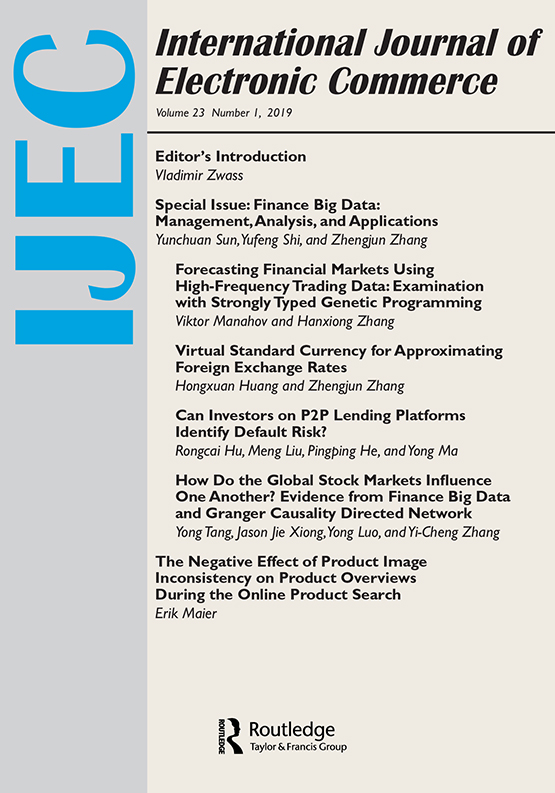社交媒体影响者的异质性或同质性:双重副社会关系在冲动购买中的作用
IF 3.8
3区 管理学
Q2 BUSINESS
International Journal of Electronic Commerce
Pub Date : 2023-09-19
DOI:10.1080/10864415.2023.2255112
引用次数: 0
摘要
摘要社交媒体平台的激增使得社交媒体影响者能够触发消费者的冲动购买行为。社交媒体影响者的有效性依赖于他们与追随者建立准社会关系的能力。通过利用异性恋和同质性,网红可以培养双重副社会关系,以满足其追随者的信息寻求或情感交流需求,从而影响冲动购买。然而,人们对双重副社会关系对冲动购买行为的贡献以及异性恋(与同质)在培养不同类型副社会关系中的竞争作用知之甚少。根据社会关系的两个基本维度,本研究区分了工具性和表现性副社会关系,以调查和比较它们对冲动购买行为的影响。此外,我们将异性恋(相对于同性)分解为可见、信息和价值维度,以研究它们对双重副社会关系的影响。研究结果表明,双重副社会关系对冲动购买行为有不同的影响。此外,三种类型的异亲性(相对于同质性)对双重副社会关系表现出复杂的非线性影响。这些见解促进了我们对冲动购买背景下的异性恋、同质性和副社会关系的理论理解。他们还为社交媒体影响者营销人员提供了实用的指导,以制定有效的策略来维持与粉丝的关系,同时利用异性恋和同质性的力量。关键词:社交商业异性恋同性关系冲动性购买网络影响者网上零售网上关注者披露声明作者未报告潜在的利益冲突。本研究由国家自然科学基金资助(项目编号:no. 1)。国家社科基金项目(项目编号:72171095);22VRC153和no。18 zda109)。胡倩(huq@wtu.edu.cn),中国武汉纺织大学管理学院助理教授。主要研究方向为社交商务、信息管理和智能服务。她的研究成果发表在《国际信息管理杂志》、《互联网研究》、《行为与信息技术》等期刊上。赵攀赵攀(victola.pz@gmail.com;通讯作者),中国华中科技大学管理学院副教授。潘博士的研究重点是智能服务、社交商务和社交计算。他的研究成果发表在《管理信息系统杂志》、《信息与管理》、《信息技术与人》、《国际信息管理杂志》、《计算机与人类行为》等期刊上。卢耀斌(luyb@hust.edu.cn),华中科技大学管理学院管理科学与信息系统特聘教授。卢博士的研究兴趣包括社交商务、移动商务、商业模式、电子商务等相关课题。王斌(bin.wang@utrgv.edu),美国德克萨斯大学里奥格兰德谷分校信息系统教授。他在《管理信息系统杂志》、《国际电子商务杂志》、《决策支持系统》、《信息与管理》、《信息技术杂志》、《信息系统杂志》等主要国际期刊上发表了60多篇论文。他的研究重点是社交媒体和社交商务、众筹、电子商务、移动商务、信息技术(IT)采用和IT公司的绩效。她在《Journal of Management Information Systems》、《信息与管理》、《信息系统杂志》等期刊上发表了40多篇论文。本文章由计算机程序翻译,如有差异,请以英文原文为准。
Heterophily or Homophily of Social Media Influencers: The Role of Dual Parasocial Relationships in Impulsive Buying
ABSTRACTThe proliferation of social media platforms has empowered social media influencers to trigger impulsive buying behavior among consumers. The effectiveness of social media influencers relies on their ability to establish parasocial relationships with their followers. By leveraging both heterophily and homophily, influencers can cultivate dual parasocial relationships that cater to their followers’ needs for information seeking or affection exchange, thereby influencing impulsive buying. However, little is known about the contribution of dual parasocial relationships to impulsive buying behavior and the competing roles of heterophily (vs. homophily) in fostering different types of parasocial relationships. In line with the two fundamental dimensions of social ties, this study distinguishes between instrumental and expressive parasocial relationships to investigate and compare their effects on impulsive buying behavior. Additionally, we dissect heterophily (vs. homophily) into visible, informational, and value dimensions to investigate their impacts on dual parasocial relationships. The findings reveal that dual parasocial relationships have varying effects on impulsive buying behavior. Furthermore, the three types of heterophily (vs. homophily) exhibit complex and nonlinear impacts on dual parasocial relationships. These insights advance our theoretical understanding of heterophily, homophily, and parasocial relationships in the context of impulsive buying. They also offer practical guidance for social media influencer marketers to develop effective strategies for maintaining relationships with followers, while harnessing the power of both heterophily and homophily.KEY WORDS AND PHRASES: Social commerceheterophilyhomophilyparasocial relationshipimpulsive buyingonline influencersonline retaile-retailonline followers Disclosure statementNo potential conflict of interest was reported by the author(s).Additional informationFundingThis work was supported by grants from the National Natural Science Foundation of China (NSFC) (project no. 72171095) and the National Social Science Fund of China (project no. 22VRC153 and no. 18ZDA109).Notes on contributorsQian HuQIAN HU (huq@wtu.edu.cn) is an assistant professor at the School of Management, Wuhan Textile University, China. Dr. Hu’s research focuses on social commerce, information management, and smart service. Her work has been published in International Journal of Information Management, Internet Research, Behaviour & Information Technology, and other journals.Zhao PanZHAO PAN (victola.pz@gmail.com; corresponding author) is an associate professor in the School of Management at Huazhong University of Science and Technology, China. Dr. Pan’s research focuses on smart service, social commerce, and social computing. His work has been published in the Journal of Management Information Systems, Information & Management, Information Technology & People, International Journal of Information Management, Computers in Human Behavior, and other journals.Yaobin LuYAOBIN LU (luyb@hust.edu.cn) is a specially appointed professor in management science & information systems at the School of Management, Huazhong University of Science and Technology, China. Dr. Lu’s research interests include social commerce, mobile commerce, business mode, electronic commerce, and related topics. He is the author of more than 60 publications in leading international journals such as Journal of Management Information Systems, International Journal of Electronic Commerce, Decision Support Systems, Information & Management, Journal of Information Technology, and Information Systems Journal,Bin WangBIN WANG (bin.wang@utrgv.edu) is a professor of information systems at the University of Texas Rio Grande Valley. Dr. Wang’s research focuses on social media and social commerce, crowdfunding, electronic commerce, mobile commerce, information technology (IT) adoption, and performance of IT-focused firms. She has published over 40 refereed articles in such journals as Journal of Management Information Systems, Information and Management, Information Systems Journal, and others.
求助全文
通过发布文献求助,成功后即可免费获取论文全文。
去求助
来源期刊

International Journal of Electronic Commerce
工程技术-计算机:软件工程
CiteScore
7.20
自引率
16.00%
发文量
18
审稿时长
>12 weeks
期刊介绍:
The International Journal of Electronic Commerce is the leading refereed quarterly devoted to advancing the understanding and practice of electronic commerce. It serves the needs of researchers as well as practitioners and executives involved in electronic commerce. The Journal aims to offer an integrated view of the field by presenting approaches of multiple disciplines.
Electronic commerce is the sharing of business information, maintaining business relationships, and conducting business transactions by digital means over telecommunications networks. The Journal accepts empirical and interpretive submissions that make a significant novel contribution to this field.
 求助内容:
求助内容: 应助结果提醒方式:
应助结果提醒方式:


